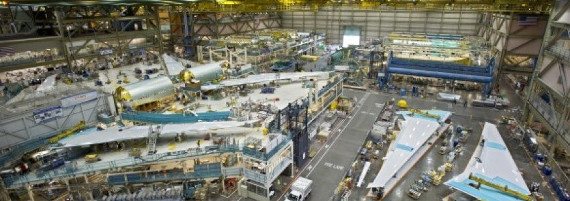Big and clever: a system-wide approach to data analytics

The Distributed Information and Automation Laboratory (DIAL) at the IfM are working with companies such as Boeing, Exxon, Electrolux and Laing O’Rourke to develop smart ways of using data to improve performance and increase resilience.
In the past, industrial analytics have tended to focus on individual machines in individual factories. We now understand that a factory – or more often a multi-sited production network – is more than the sum of its parts and that if we are to make significant improvements to performance we need to embrace the whole system, within and across factories and their associated supply chains.
Machines tend to have individual maintenance plans designed to keep them performing optimally. But this is not necessarily a good thing for the production system as a whole and may actually result in poorer performance. At DIAL we are developing a ‘social network’ for machines which can deliver an optimum maintenance plan for the production system as a whole.
The ‘social network’ provides a common platform which allows machines to ‘update their status’. For example, a machine may self-diagnose that it will fail in three weeks’ time. The system may know that maintenance for that machine is scheduled for the next week, in which case no action need be taken. But it may be that a new component is needed which is not available for five weeks. If that is the case the life of the failing machine could be extended by a further two weeks if the machine which feeds parts into it slows itself down. By creating a social-network based, data-sharing platform which enables machines to cooperate – to behave altruistically towards one another – we can build a much smarter system which will be more resilient, more productive and better able to manage its energy consumption by intelligently adjusting machine performance as required.
Building resilience is critical in the face of both minor, short-term disruptions (which cumulatively have a significant impact on performance) and major global events such as climate change. Two of our current projects focus on increasing resilience through smart systems. The first is looking at more intelligent production control systems which will tolerate higher levels of product variability and can dynamically alter the balance between lean and resilient operations to cope with disruptions. The second focuses on the supply chain, using data analytics to predict when suppliers will fail to deliver on time so that the manufacturer can take pre-emptive steps to avoid potential disruption.
Creating more more resilient and more energy-efficient operations is going to become increasingly important for manufacturers in the coming years. By developing intelligent, data-enabled systems we aim to help them find smart solutions to the challenges they face.
This article first appeared in UK Manufacturing Review 2015 – 2016 published by Stirling Media Ltd.










